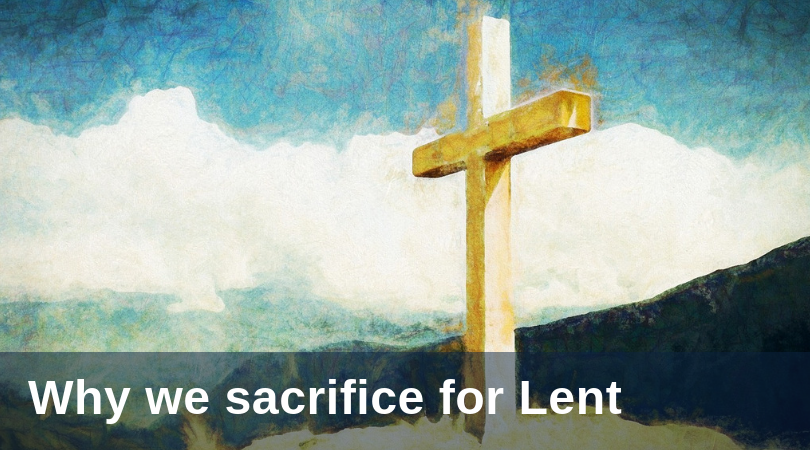
During Lent, the Church asks us to prepare for Christ’s passion and resurrection by making small sacrifices, traditionally in the form of prayer, fasting and almsgiving. But why do we sacrifice? What is a sacrifice, anyway?
Today we don’t always talk about “sacrifice” in a religious way, but the word itself is imbued with a deeply religious meaning. St. Thomas Aquinas observes that the Latin word sacrificium comes from sacer (holy) and facere (do or make). A sacrifice is a making-holy. Not only that, but St. Thomas’ discussion of sacrifice reveals so much about our own nature and our relationship to God, it is well worth mining for some Lenten inspiration. He describes a sacrifice as a bodily act of offering to God a gift that is broken or transformed, so that we might return to God.
A bodily act
Consider the blood-sacrifices or burnt offerings of ancient times: a goat, perhaps, slaughtered and burned on a sacred altar. Sacrifice is fundamentally a religious act of offering a gift to God. Unlike interior devotions, ritual sacrifices are visible, bodily acts performed on behalf of a community. But isn’t this actually a bit strange? If God is all spirit, how could he possibly need our physical offerings?
God isn’t going to eat the peanut butter I give up for Lent. He certainly doesn’t share my propensity for eating spoonfuls of my roommate’s peanut butter before bed (sorry, Molly!). St. Thomas explains that our physical offerings are not really for God’s benefit, but for us. As a beautiful unity of body and soul, the human person experiences reality through the physical senses. Even God presents himself to us through the sensible things of creation—as Hopkins puts it, “The world is charged with the grandeur of God.” It is fitting, then, that we present ourselves to God through sensible things as well. Think of the Sacraments: all are visible signs of invisible grace. Lenten fasting and sacrifices are tiny sacramental signs of the true gift we give God: ourselves, body and soul.
A gift broken or transformed
However, a sacrifice is not just any gift. St. Thomas explains that an offering only becomes a sacrifice when it is changed: the goat is slaughtered, the bread is broken, the grain is consumed by fire. In being transformed, the offering is set apart and made holy. Christ himself, the consummate sacrifice, was mutilated, pierced and subjected to death.
When I give up peanut butter, the peanut butter doesn’t change. When I give cash or canned foods to a local shelter, those goods are not destroyed. But for these to be real sacrifices, something must be broken and transformed—and that something must be me. Lenten practices of prayer, fasting, and almsgiving break little cracks in the brittle illusion of our own self-sufficiency. They invite us to acknowledge our own brokenness, susceptible as we all are to the corrupting effects of sin. And they invite God’s grace to transform us and make us holy. “The sacrifice acceptable to God is a broken spirit; a broken and contrite heart, O God, thou wilt not despise” (Psalm 51:17).
Return to God
Why, then, do we sacrifice? We do it to return to God, and this return happens in two distinct ways. First, through sacrifice we “return to God” in the sense of giving back what we owe him. Of course, we can’t possibly repay God for his gifts with an equal return—he is the source of our very existence! We owe him everything. Nevertheless, we can do our part: our small personal sacrifices signal the return of self back to God. And thankfully, Christ lovingly repaid our dues in full through his perfect self-sacrifice, which we too can offer to God every time we participate in the Mass.
Second, through sacrifice we “return to God” in the sense of turning back towards him over and over again. Like the Israelites, we are constantly turning away from God and towards sin. As God called Israel to repentance through the prophets, he still calls us: “Return to me with all your heart” (Joel 2:12).
Lenten practices help us shed bad habits and self-love. St. Thomas says these religious acts purify us to orient ourselves more single-mindedly towards God. When we respond thus to the divine call—when we offer ourselves up, body and soul, to be broken and transformed by his merciful love—we are made holy.


